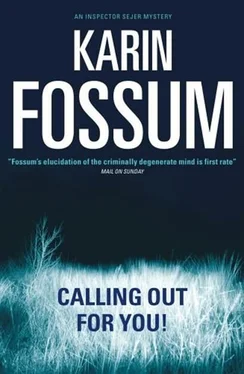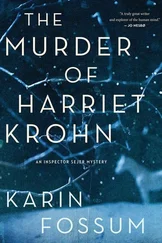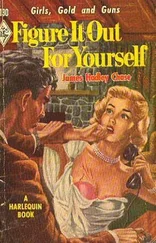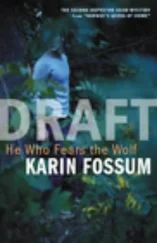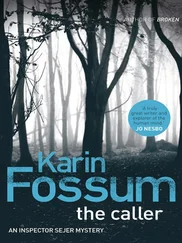"Nothing much. I had a Coke while I was there. Looked at the CD stand. Leafed through a newspaper."
"So you spent quite a time in there?"
"Only a few minutes really."
"You didn't see the Indian woman leave the café?"
"No, no."
"And afterwards. Where did you go?"
"Back to town. No return fare to be had in Elvestad. Had no choice but to drive back on my own."
"Your cab. What make is it?"
"Mercedes. A black one."
"How many people live in New Delhi?"
They were in the canteen. Sejer prodded his food.
"Millions, I guess," Skarre said. "And we don't know his first name."
Sejer. did not like the idea that Poona Bai had a brother who was unaware of what had happened. He removed the garnish from his sandwich. They ate in silence.
"Time's passing," he said eventually.
"Indeed," Skarre said. "It tends to."
"A guilty person spends his time wisely. He creates an alibi. Gets rid of the evidence."
"Such as the suitcase," Skarre said, between mouthfuls.
"And the clothes he wore. His shoes. If he has sustained any injuries as result of the struggle then they heal. Tell me about Einar Sunde."
Skarre pondered. "Sullen. Uncooperative. Doesn't see any need to be in the limelight."
"Or scared," Sejer said.
"Could be. But he was alone in his café when the murder took place. He'd hardly have locked the door, gone out and killed Poona and then come back in to flip hamburgers."
"We've only got his word for it that he was alone." Sejer wiped his mouth with the napkin. "This is turning into the kind of case where people are terrified to talk," he said. "Everything will be used against them later on. But I've been thinking about this young woman, Linda. That she did in fact cycle past them. Without seeing anything other than a white shirt."
"It happens."
"There must be a way of making her remember."
"You can't remember what you didn't actually see," Skarre objected. "The visual impressions might have been plentiful, but if the brain didn't interpret them then she'll never be able to recall them."
"Is there anything you don't know!"
"Basic witness psychology," Skarre said.
"Really! We didn't have that in my day."
"Surely you were taught psychology?"
"One lecture. Two hours. That was all."
"During your entire training?"
"I've had to work things out for myself."
Skarre looked at his boss in disbelief.
"I'm sorry to have to say it," he said, "but I'm not sure just how serious she is. She's too keen."
"If psychologists can get people to recall past lives, all the way back to the Stone Age, they should be able to revive Linda's memory of two people in a meadow four days ago."
"You're just not taking this seriously," Skarre said.
"I know."
He focused on the case again. "I've got an hour to spare now. I'll go to Hvitemoen. I'll take Kollberg, he needs some fresh air."
They put their trays back. Sejer went to the car park. As he approached his car he noticed it was bouncing violently. The heavy Leonberger sprang out. Not as agile as he used to be, Sejer thought, but then he wasn't a young dog any more.
He brushed copper-red dog hair from his trousers. Allowed the dog to relieve itself in the bushes. Then he drove to Elvestad. At Hvitemoen he parked in the place where Linda had seen the red car parked. It was marked with two orange cones. He let the dog loose again and started walking towards the bend from where Linda had come cycling. He turned his head and looked back. He could now observe his own car from a considerable distance. The sun gleamed on the paintwork and made it shine like silver although it was in fact blue. He walked briskly down the road with the dog beside him. A few paces on and he turned and looked over to the meadow where they had found the woman. A man or a woman would probably be visible from the waist up given the distance and the long grass. He looked at his car again. What was he actually seeing? That the car was big and wide and had metallic paintwork. At a glance it could pass for silver or grey. A car reckoned to be red might turn out to be brown. Or orange. He felt depressed, stopped by the roadside and looked down at the grass to make sure it was dry before he sat down. The dog sat next to him. It looked at him expectantly. Started sniffing his pockets. Sejer fished out a dog biscuit and told Kollberg to shake hands. His paw was large and heavy. The dog wolfed down the biscuit.
"Don't be greedy," he said gently.
Kollberg barked.
"No. I haven't got any more. You don't look all that well," he said pensively. He raised the dog's head and gazed into its black eyes. "I'm not on especially good form myself. Because of what has happened." He looked out over the meadow again. At the black wall of spruces which partly hid Gunwald's house. There was a flash of light from the window. How had he dared? It struck him that none of this was planned. A man had happened to come across a woman. She had been hitchhiking, perhaps, or been walking along the road when he had driven past. Then, being an exotic-looking woman, she had aroused something in him. And he had stopped thinking rationally, had not taken into account that it was still more or less broad daylight and that anyone could come by. Like the Linda girl on her bike. How could a man develop such rage against someone he probably didn't even know? Though they couldn't be sure of that. Unless it was the case that she was a substitute for some other woman. Or all women. An aggrieved man who had not got his way, a big rejected kid. A man with great strength, or having an extreme weapon, he still didn't know what it could be. What did he keep in the red car? Sejer sensed that this was part of the answer. The weapon would tell them something about who he was. Had Linda really seen the two of them? It had to be them, the timings were right. The plane had landed at 6 p.m. She had got into Kolding's cab by 6.40. They'd reached Jomann's house at 8.00 and Einar's Café by 8.15. Sunde had said that she left the café around 8.30. Alone, out on the road. She'd met someone there. Had she walked along the road with the heavy suitcase? Anders Kolding had said it was big and that she had practically had to drag it up the steps into the café. A man had driven by. He imagined a red car and the driver spotting the dark woman. How utterly helpless and irresistible she must have seemed. A delicate woman in pretty clothes. Where was she heading? Back to Jomann's house presumably, it lay in that direction. Was she proposing to wait on the doorstep? If she had not been stopped on the road she'd actually have met Jomann. He was back at his house by 9.30. But she never arrived. After the immense journey from India, she had died 1,000 metres from his house. He imagined the man stopping and talking to her. Perhaps he pointed at the suitcase and asked where she was going.
I can give you a lift, I'm going that way anyway. So he took the suitcase and put it in his boot. Opened the door for her. She felt safe, she was in Gunder's home country, safe little Norway. They drove away. He asked what she was doing at Gunder's. Perhaps she said that he was her husband. Sejer stopped and zoomed in on that image, but then it slipped out of reach because he could not imagine what had triggered the rage and the attack. The car drove away from him. Disappeared behind the bend. The dog nudged him with its snout.
"In a place like this," Sejer said aloud and studied the wood and the meadow and Gunwald's house. "In a place like this people will protect one another. That's how it always is. If they've seen something they don't understand they wouldn't dare to say so. They think I must be mistaken, I grew up with him, we've worked together and anyway, he's my cousin. Or neighbour. Or brother. We went to school together. So I won't say anything, it must be a mistake. Human beings are like that. And that's a good thing, isn't it, Kollberg?" He looked at the dog. "We're not talking about evil here, but the good in people which stops them from saying what they know."
Читать дальше
